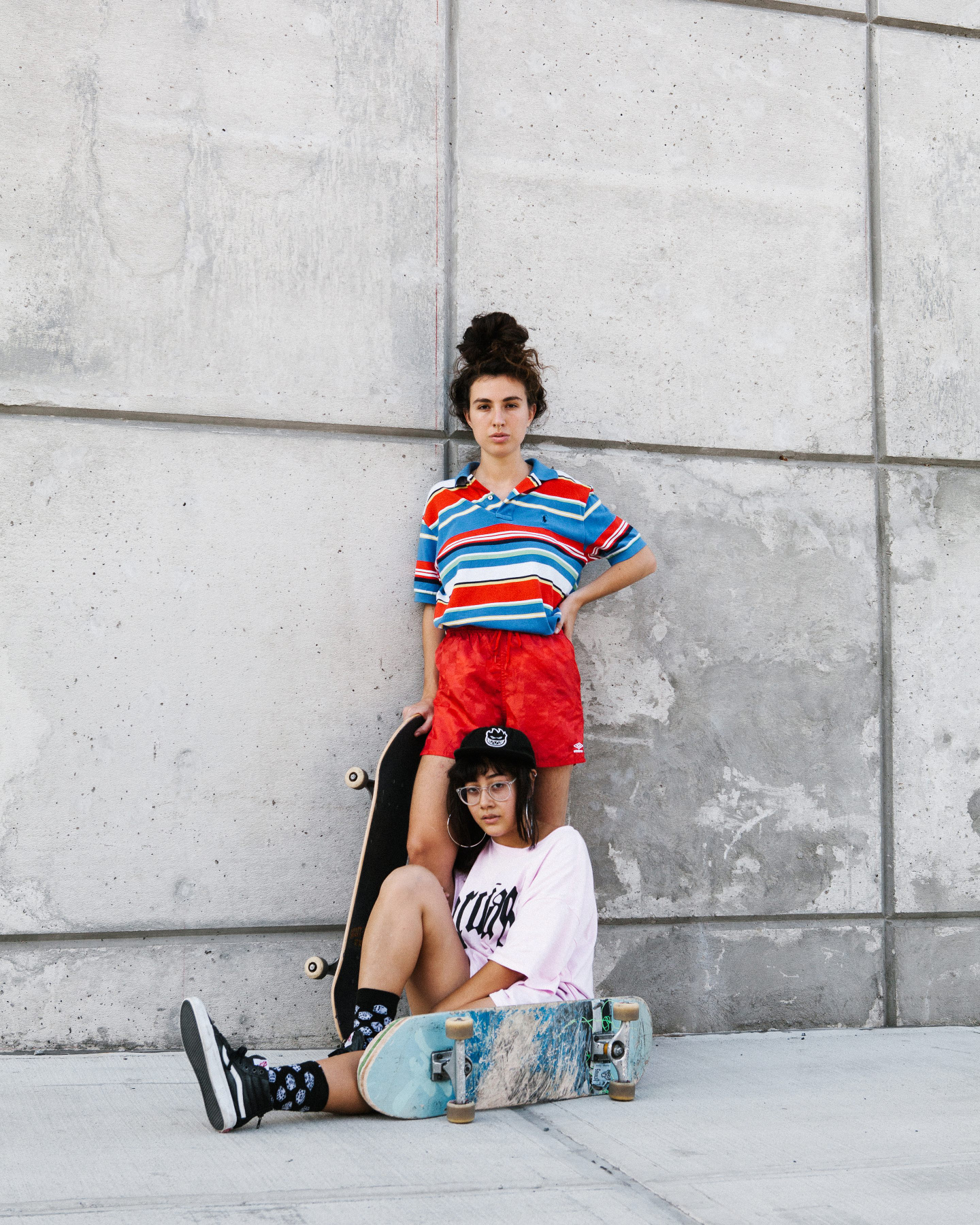 Arianna Gil and Sam Olivieri of the Brujas
Arianna Gil and Sam Olivieri of the Brujas
On a windy Friday evening in November of last year, I made my way to River Avenue Skatepark in the Bronx, holding a Target-bought skateboard by its trucks. I made the hour and thirty minute trek from my home in Jamaica, Queens, after reading an article on Bitch Media that featured the Brujas, an all-woman, POC skate crew. I had always wanted to skate but a lack of visibility of women within the sport prevented me from doing so; it seemed that skateboarding was a boys club. A club in which I did not belong. Everything about skating intimidated me: the air of hyper masculinity from its almost all-male participants; the possibility of physically hurting myself; the fear of not being taken seriously as a woman. I couldn't see myself amongst the guys I saw skating around the city; the ones that loitered around the Lower East Side and Chinatown in their uniformed get-ups of Dickies, Vans, and fanny packs. But my introduction to the Brujas provided me with the encouragement I’d been seeking. Reading about them gave me the push to borrow my cousin’s board that afternoon and take three trains to find the Brujas’s favorite skate park under the train tracks. When I got there, I awkwardly skated around — I wasn’t really sure what you did at a skate park — until I saw a girl sitting by the fence. I knew immediately that she was a Bruja. Her name, I found out, was Nati Limon. I explained to her how I had come to this park because of her skate crew. She was kind, and suggested I practice an “ollie,” (a trick that allows the skater to jump over and onto objects), as well as warning me not to stay too late, because after dusk, cops crept around on the hunt for delinquents. Since that night, skating is all I do.
Over the past year, there has been a rise in the representation of women-identifying skaters and crews on the internet. Social media platforms such as Instagram have provided marginalized skaters with the means to create their own narratives and communities outside of the mainstream, hegemonic skate world. It’s allowed groups such as Chicago’s Get Born crew, L.A.'s Meow Skateboards, and even Girl’s Skate India to have visibility and encourage others who don’t fit the typical definition of a skater to give the sport a try. It is through social media that many New York-based woman skaters and woman-led skate crews have been able cultivate a following and create a presence within the city’s male-dominated skate scene.
When New York’s Emily Tarnacki, aka @lilnicegirl, got an Instagram just over a year ago and started posting short, light-hearted clips of herself attempting new tricks at skateparks around the city, she never thought it would gain her over 15,000 followers or land her a spot in the Montreal brand Dime’s skate competition, the Glory Challenge, this past August. For some skaters, Instagram has become more than a place to show off tricks or keep tabs on the hippest skate teams. East Coast, women-led crew The Skate Kitchen, for example, use Instagram to create visibility for women street skaters, challenging gender stereotypes by showing them fearlessly weaving through N.Y.C. traffic. And for the Brujas, social media is a medium to speak out on injustice and encourage their followers to come together to discuss issues. Through their Instagram account they orchestrate skate days, workshops, sucias (parties), and work to create safe spaces and community for queer, femme, LGBTQ young people of color — not only at skate parks but within the city as a whole.
This past August, on a humid Saturday afternoon, Brooklyn’s Cooper Park was packed. Skaters made their rounds, showing off tricks and rehearsed lines. Some hung on the sidelines cheering on friends, some lounged at the park’s benches, smoking cigs and rolling joints. Per usual, the men dominated the space. But when members of The Skate Kitchen, the Brujas, and Tarnacki arrived with decks in hand, the atmosphere shifted. Everyone watched as Tarnacki and Lizzi Reid of FemmeSkate, another N.Y.C. collective, took turns dropping in. The Brujas’s Sam Olivieri practiced flatground tricks with The Skate Kitchen's Karbrina Adams, who boldly shredded shirtless. Nobody paid any mind to the curiosity they sparked. Tricks were encouraged, ledges were skated, and the summer heat was as loud as the wheels skirting the pavement. The FADER talked with The Skate Kitchen, the Brujas, and Emily Tarnacki about skate culture, radical feminism, and the importance of representation.
The Skate Kitchen
The Skate Kitchen is a mixed gender skate crew founded by 18-year-old Brooklyn College freshman Rachelle Vinberg less than a year ago. They spend most of their days at the Chelsea Pier 62 Skatepark and street spots around the city. They are currently the subject of a Miu Miu fashion film called That One Day.
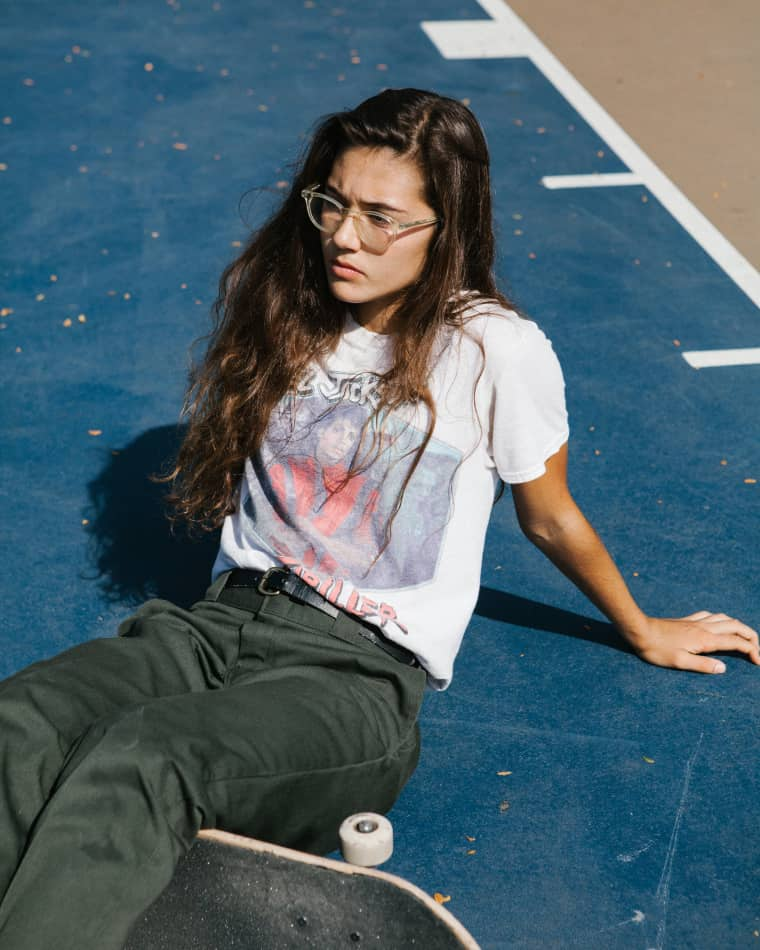 Rachelle Vinberg of The Skate Kitchen
Rachelle Vinberg of The Skate Kitchen

“Skateboarding is like an art, and to be able to share ideas through a variety of types of people, it makes it better.” —Rachelle Vinberg
How did the skate kitchen come into existence?
Rachelle Vinberg: The real start of it was like when I first started skating. Me and my friends, who are all boys, were just hanging out in the front of my house and we were discussing if we owned a skate shop what would we call it. I was like, "The Skate Kitchen," because at the time the only skaters that I saw that were girls were on YouTube and a lot of like trolls would comment, "Oh she should be in the kitchen, making me a sandwich." I just thought it was an awesome way to express ourselves in our way that is kind of mocking those who belittle us. If you want us to be in the kitchen, then we are in the kitchen; we are in The Skate Kitchen.
You often say that you guys are "East Coast cooking." What does that mean?
Vinberg: A lot of the girls that you see in the media that are [featured] by big skate companies, [they’re] from California, where everything is perfect, where everything is pretty. There is really no coverage of girls out here on the East Coast, and I really think that the style out here — the way we skate and the way we dress — is really different. It would be cool to show that to the world and at the same time encourage girls out here to get a board and go ahead and skate. The cooking is just a play on words.
Ardelia Lovelace: It's pretty much a lot of transition on the West Coast, so [East Coast skating] is more laid-back and more street stuff.
The Skate Kitchen is made up of girls and guys — what is the benefit non-gendered crew?
Vinberg: There are a lot of crews out there that are just for girls and that’s good because girls are the minority in the sport, but I think a better way to [combat] that is to integrate girls and boys and skate as a community, because [with both] boys and girls there’s kind of a magic that happens when we are all together, having fun and sharing ideas. We are just all different, and boys will bring out that desire to land more tricks. They’re competitive; they make you want to go hard. Skateboarding is like an art, and to be able to share ideas through a variety of types of people it makes it better.
Is the representation of women skaters important? If so, why?
Lovelace: When you see another girl at the park, you think, If she can do it, I can do it. The more you see girls [skating], the less intimidated you are by all the dudes.
Vinberg: I think it's important for younger girls because when you look at skateboard ads, you only see boys, and even though it doesn't say that this is a boys-only sport, if a little girl looks at it, they are going to create that idea in their mind that skateboarding is associated with boys. If there were more [representation of female skaters], more girls in ads or whatever, then it would be like, Oh yeah, girls do it too.
What tips would you give to girls who want to skate but are intimidated?
Kabrina Adams: Go buy a board and go to the skate park.
Vinberg: I'd say learn how to push around, and look on YouTube. I started by just looking on YouTube and learning how to ollie. You have to commit; you have to commit to start, you have to commit to land your tricks. Everything is commitment.
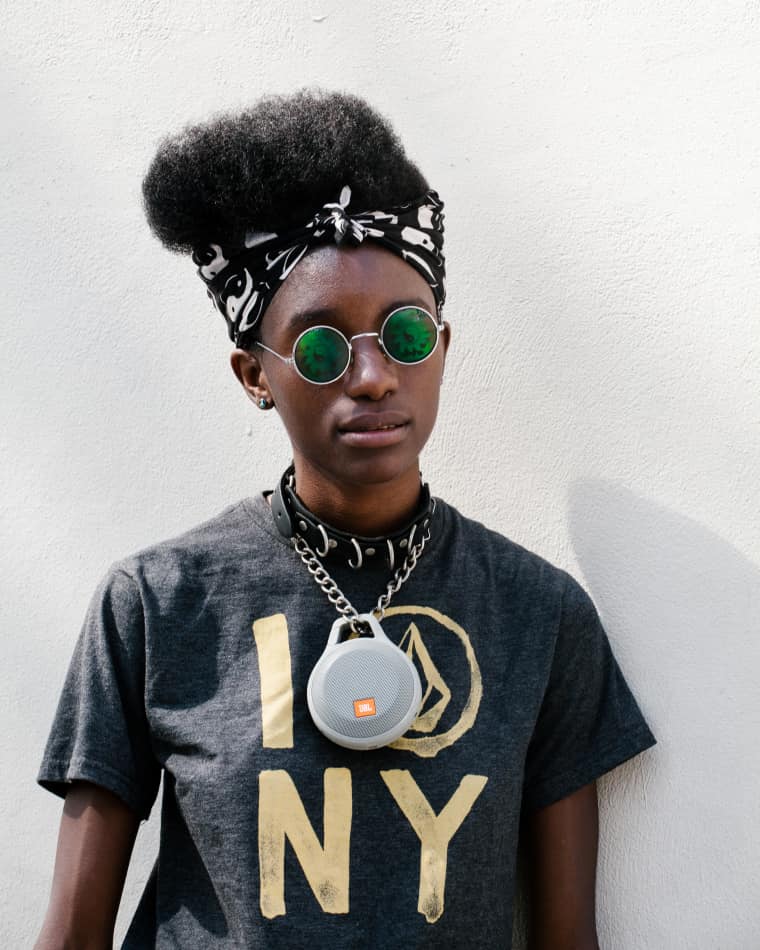 Kabrina Adams of The Skate Kitchen
Kabrina Adams of The Skate Kitchen

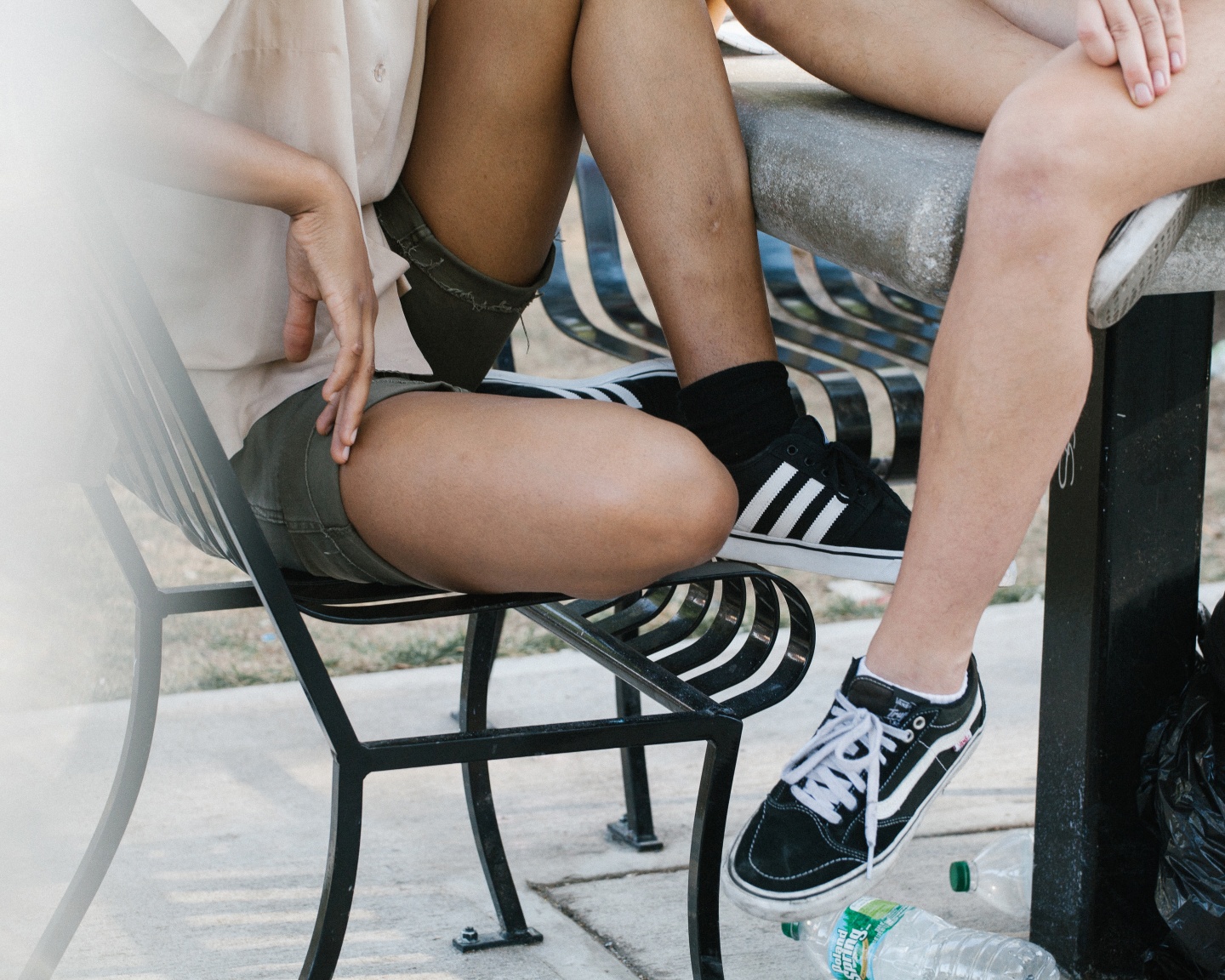






Brujas
Founded by Arianna Gil and Sheyla Grullón in 2014, the Brujas is a POC collective of skaters who are challenging the traditional discourse about gender in a male-dominant sphere. Although the Bronx’s Riverside Park is the Brujas’s park of choice, they have members from all over New York. They are using their growing following on social media as a platform to start sociopolitical conversations inspired by the work of radical groups and thinkers such as Angela Davis, the Young Lords, and the Black Panthers. For the members of Brujas, their crew is about more than skating; it's about resistance to white supremacist, capitalist, patriarchal society.
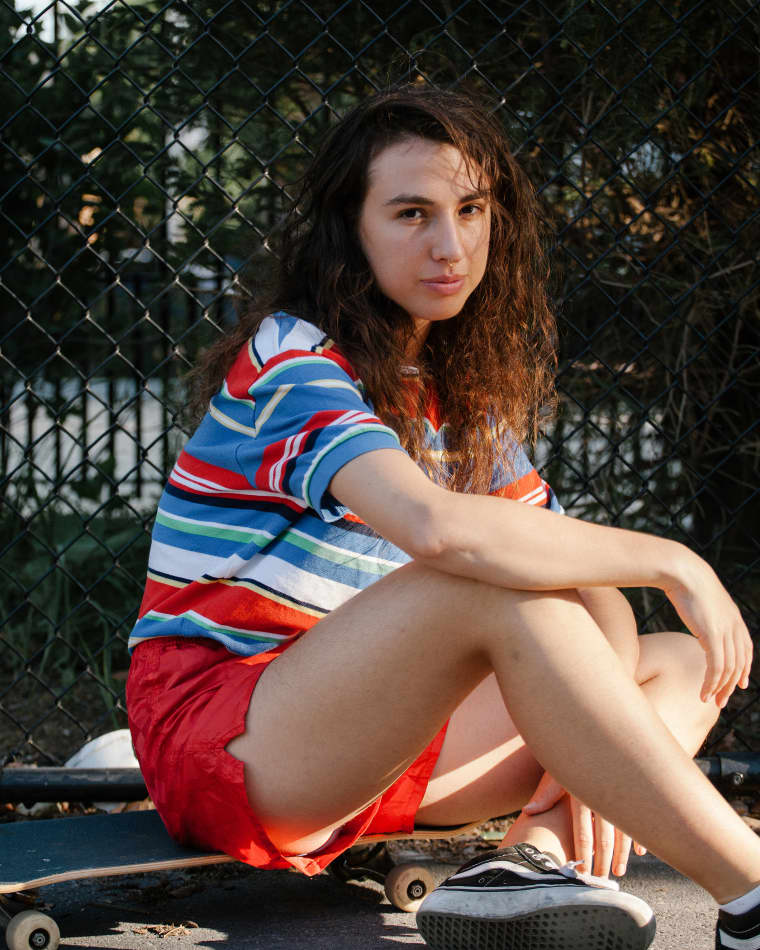 Arianna Gil of the Brujas
Arianna Gil of the Brujas

“‘Woman’ is becoming an arbitrary word to us as a collective — or at least to me as an individual.” —Arianna Gil
What led to the creation of the Brujas?
Arianna Gil: Brujas has always been. There is no beginning or end to a free form art concept that is often misperceived as just some kind of skateboarding game. [It’s] the nature of being a creative, street-situated woman in New York City, or queer or femme. "Woman" is becoming an arbitrary word to us as a collective — or at least to me as an individual — but I think Brujas has just been manifesting since we were consciousness individuals in New York. It did pop up a few years ago as a fun crew concept, with no intention of being a brand, with no intention of having photo shots. [It was] really just finding camaraderie with other people who share that experience. It manifested into a concrete crew a couple years ago but it’s been part of our existence [for a lot longer]. The experience [is more important] than the exact story of what happen or when it started. This shit has always been is kind of my point.
How does the Brujas instill sisterhood?
Sam Olivieri: I have seen younger girls pull up to my local skate park and I had this conversation with them about how I respect that they come into this environment knowing how hyper-masculine it can be, and how toxic that can be for them and their progress, because we do this for fun — we are not here to be the world's next best skateboarder, you know. This is just to help sustain and nurture an environment that encourages everyone and their own respect of progress. The fact that I can skate street with other girls and also encourage girls is really important.
Why is that encouragement important?
Olivieri: It just shows solidarity and that we care for each other and [our] safeness. I think it's very important as New Yorkers with our neighborhoods being gentrified and spaces feeling less safe — especially for people of color, since we don't feel like our law enforcement protects us either. [But] with all of us standing as individuals and standing collectively as Brujas, [it's] very strong.
How has Brujas's ideology and definition of feminism evolved? Especially in the face of all the media attention you have received.
Gil: We are really trying to shift our discourse away from liberal identity politics, culture-directed conversation, and more towards the legacy of organizations that were Marxist, Maoist, and communist, like the Young Lords or the Black Panthers. We are out here for woman and for femmes but gender binary is becoming increasingly absolute. It's time to start having conversations beyond just feminism from a binary perspective. I think our feminism is developing into one that is more about gender deviance.
How are the Brujas pushing that agenda? What projects do you have in the works?
Gil: To propagate the prison abolishment movement, Brujas is starting a bail fund, and we hope to raise between $8,000 and $10,000 [by] running a product line. It's going to be fire — a hot little streetwear piece. We are working on designs right now.
Are the designs made by you guys?
Gil: Robin Giordani from the Corner Society and CZARQUAN from NOCTURNAL SONS POSSE are designing it; there are like real clothing designers. With that money, the real idea is to create direct material to support bail funds. We support women who commit crimes, who are in street culture and rack up charges for doing graffiti for loitering and trespassing — all this sort of gender deviance that we are talking about. We want to have a pool of money that we can immediately, without strings, send. We are also pairing up with a group called Fight to Live, which is a more established long-term running bail fund for people who are deviants to the state. We are just contextualizing the prison abolish movement.
Recently you guys had a skate memorial for Maylin Reynoso, the 20-year-old woman who went missing in July, and was later found dead. Your event brought media attention to her story, which until recently had not received any coverage. Why do you think media outlets were so silent about her story and other POC women who go missing in this city?
Gil: The fact that us doing something made a bunch of media happen, that is insane. All these people wrote articles after we did our event, but where were they when I was doing this event completely by myself or when people were looking for her? People don't really understand the true nature of 21st century racism in urban imperial centers like New York — it's about premature death. You can't have a conversation about racism in the U.S. without having a conversation about premature death. There are woman [being murdered] at age 20, and nobody gives a fuck. There are young black men being killed by the police all the time, and nobody gives a fuck. I think this a moment to sit back and [think] outside of identity politics, what functions does racism have in the U.S. right now? I think in case like Maylin's there are so many reason why there wasn't media coverage, but to be completely honest [it's about] just how undervalued the lives of young girls of color are.

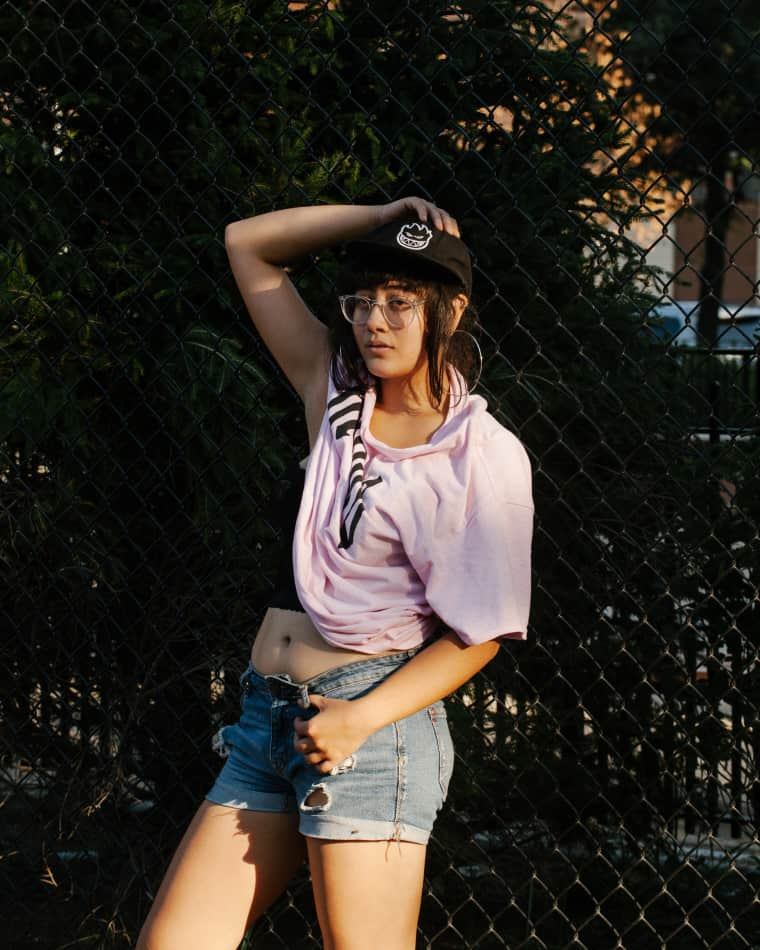 Sam Olivieri of the Brujas
Sam Olivieri of the Brujas




Lil Nice Girl
Emily Tarnacki, 23, only began skating at the age of 20, but her effortless style has gained her a serious following on social media. Her loop-worthy clips on Instagram as @lilnicegirl illustrate her fearless yet laid-back approach to skating. Whether she's mastering the no comply or bailing on a hippy jump, she is almost always smiling, and dressed in her trademark pink and white attire. Splitting her time between upstate New York, where she is from, and the city, Tarnacki is rapidly making a name for herself within the skate world.
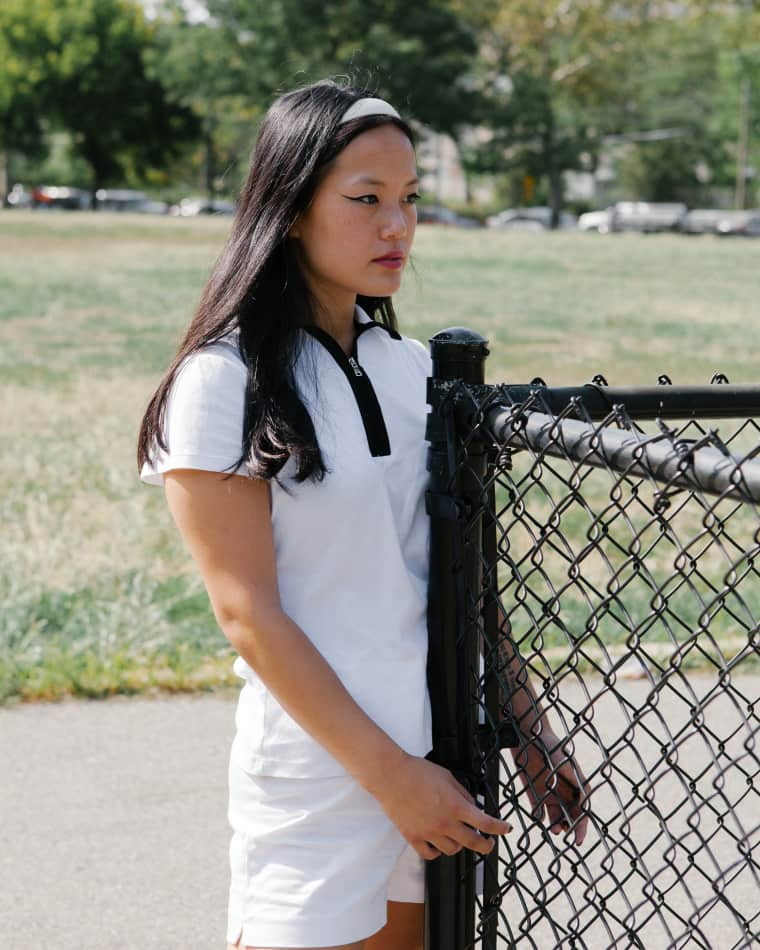 Emily Tarnacki, aka @lilnicegirl
Emily Tarnacki, aka @lilnicegirl

“Find people that you feel comfortable with, that can teach you and help you, or learn with other girls.” —Emily Tarnacki
What attracted you to skating?
It looked really fun. That’s it really.
Did you feel any intimidated when you started out, and if so how did you overcome it?
I did at first. I always wanted to skate since I was younger, but I didn't until I was like 20-years-old. I was living with a bunch of my friends in Salt Lake City and they all skated, so doing it with them, it was easier. I wanted to start when I was like 14 or 15, and I even brought a skateboard, but I never used it because I was nervous and didn't know what to do.
Did you think your Instagram posts would get the amount of attention that they have?
I think last summer, I just made [an Instagram] one day after the skate park and it was really fun. I didn’t think they would become that popular, but I guess they were. It’s really fun to edit them.
For a lot of women and girls, seeing you on social media has encourage them to give skating a try. Do you think a rise in visibility of non-male skaters is important?
Yeah, it is because other girls see that and they say, "Yeah, I can do that too."
Do you have tips for girls just starting out, who might feel a little nervous and intimidated as you once did?
Yeah, just do it with your friends. Find people that you feel comfortable with, that can teach you and help you, or learn with other girls. But definitely find some friends and do it with them.




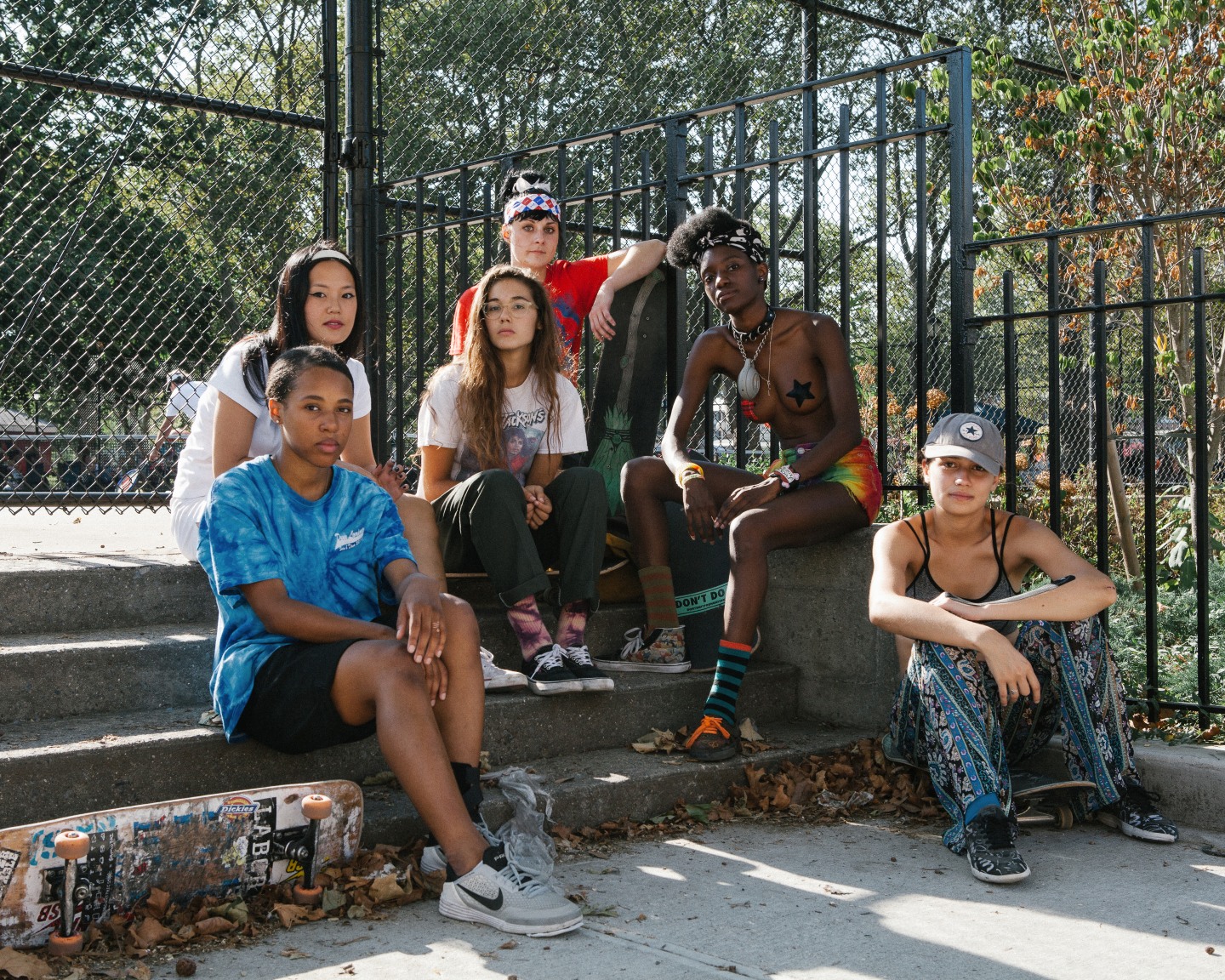 Left to right: Ardelia Lovelace (The Skate Kitchen), Emily Tarnacki (@lilnicegirl), Rachelle Vinberg (The Skate Kitchen), Lizzi Reid (of FemmeSkate), Kabrina Adams (The Skate Kitchen), and Danielle Melendez (Brujas)
Left to right: Ardelia Lovelace (The Skate Kitchen), Emily Tarnacki (@lilnicegirl), Rachelle Vinberg (The Skate Kitchen), Lizzi Reid (of FemmeSkate), Kabrina Adams (The Skate Kitchen), and Danielle Melendez (Brujas)